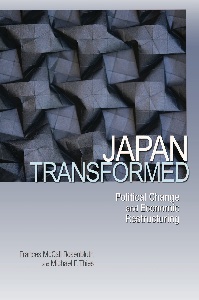DEPARTMENT OF POLITICAL SCIENCE
UNIVERSITY OF CALIFORNIA, LOS ANGELES


DEPARTMENT OF POLITICAL SCIENCE
UNIVERSITY OF CALIFORNIA, LOS ANGELES

Peer-reviewed Journals
Scheiner, Ethan, Steven R. Reed, and Michael F. Thies. Forthcoming, Summer 2012. “The End of LDP Dominance and the Rise of Party-Oriented Politics in Japan.” Journal of Japanese Studies 38(2), 357-380.
Proksch, Sven-Oliver, Jonathan Slapin, and Michael F. Thies. 2011. “Party System Dynamics in Post-war Japan: A Quantitative Content Analysis of Electoral Pledges.” Electoral Studies 30: 114-124.
Rosenbluth, Frances, Rob Salmond, and Michael F. Thies. 2006. “Welfare Works: Explaining Female Legislative Representation.” Politics & Gender 2(2): 165-192.
Druckman, James N., Lanny W. Martin, and Michael F. Thies. 2005. “Influence Without Confidence: Upper Chambers and Government Formation.” Legislative Studies Quarterly 30(4): 529-548.
Bawn, Kathleen, and Michael F. Thies. 2003. “A Comparative Theory of Electoral Incentives: Representing the Unorganized Under PR, Plurality, and Mixed-Member Electoral Systems.” Journal of Theoretical Politics 15(1): 5-32.
Druckman, James N., and Michael F. Thies. 2002. “The Importance of Concurrence: The Impact of Bicameralism on Government Formation and Duration.” American Journal of Political Science 46(4): 760-771.
Rosenbluth, Frances M., and Michael F. Thies. 2002. “The Political Economy of Japanese Pollution Regulation.” The American Asian Review 20(1):1-32.
Thies, Michael F. 2001. “Keeping Tabs on Partners: The Logic of Delegation in Coalition Governments.” American Journal of Political Science 45(3): 580-598.
Rosenbluth, Frances M., and Michael F. Thies. 2001. “The Electoral Foundations of Japan’s Financial Politics: The Case of Jusen.” Policy Studies Journal 29(1):23-37.
Cox, Gary W., and Michael F. Thies. 2000. “How Much Does Money Matter? ‘Buying Votes’ in Japan, 1967-1990.” Comparative Political Studies 33(1):37-57.
Cox, Gary W., Frances M. Rosenbluth, and Michael F. Thies. 2000. “Electoral Rules, Career Ambitions and Party Structure: Comparing Factions in Japan's Upper and Lower Houses.” American Journal of Political Science 44(1):115-122.
Cox, Gary W., Frances M. Rosenbluth, and Michael F. Thies. 1999. “Electoral Reform and the Fate of Factions: The Case of Japan’s LDP.” British Journal of Political Science 29(1):33-56.
Thies, Michael F. 1998. “When Will Pork Leave the Farm? Institutional Bias in Japan and the United States.” Legislative Studies Quarterly 23(4):467-492.
Cox, Gary W., and Michael F. Thies. 1998. “The Cost of Intraparty Competition: The Single, Non-Transferable Vote and Money Politics in Japan.” Comparative Political Studies 31(3):267-291.
Cox, Gary W., Frances M. Rosenbluth, and Michael F. Thies. 1998. “Mobilization, Social Networks, and Turnout: Evidence from Japan.” World Politics 50(3):447-474.
McCubbins, Mathew D., and Michael F. Thies. 1997. “As a Matter of Factions: The Budgetary Implications of Shifting Factional Control in Japan’s LDP.” Legislative Studies Quarterly 22(3):293-328. REPRINTED IN Ramseyer, J. Mark, ed. 2001. Japanese Law: Readings in the Political Economy of Japanese Law. Hampshire, UK: Ashgate Publishing, 141-178.
McCubbins, Mathew D., and Michael F. Thies. 1996. “Gourisei to jisshou shugi seiji riron no kiso [Rationality and the Foundations of Positive Political Theory].” Rebaiasan [Leviathan] 19(Autumn):7-32.
Invited Contributions
Giannetti, Daniela, and Michael F. Thies. 2011. “Electoral Reform and Factional Politics in Italy and Japan.” In Daniela Giannetti and Bernard Grofman, eds. A Natural Experiment on Electoral Law Reform: Evaluating the Long Run Consequences of 1990s Electoral Reform in Italy and Japan. New York: Springer, 75-94.
Thies, Michael. F. 2002. “Changing How the Japanese Vote: The Promise and Pitfalls of the 1994 Electoral Reform.” In John Fuh-sheng Hsieh and David Newman, eds., How Asia Votes. New York: Chatham House, 92-117.
Reed, Steven R., and Michael F. Thies. 2001. “The Causes of Electoral Reform in Japan.” In Matthew Soberg Shugart and Martin P. Wattenberg, eds. Mixed-Member Electoral Systems: The Best of Both Worlds? New York: Oxford University Press, 152-172.
Reed, Steven R., and Michael F. Thies. 2001. “The Consequences of Electoral Reform in Japan.” In Matthew Soberg Shugart and Martin P. Wattenberg, eds. Mixed-Member Electoral Systems: The Best of Both Worlds? New York: Oxford University Press, 380-403.
Thies, Michael. F. 2000. “On the Primacy of Party in Government: Why Legislative Parties Can Survive Party Decline in the Electorate.” In Russell J. Dalton and Martin P. Wattenberg, eds. Parties Without Partisans. New York: Oxford University Press, 238-257.

Book
Rosenbluth, Frances McCall, and Michael F. Thies. 2010. Japan Transformed: Political Change and Economic Restructuring. Princeton, N.J.: Princeton University Press
